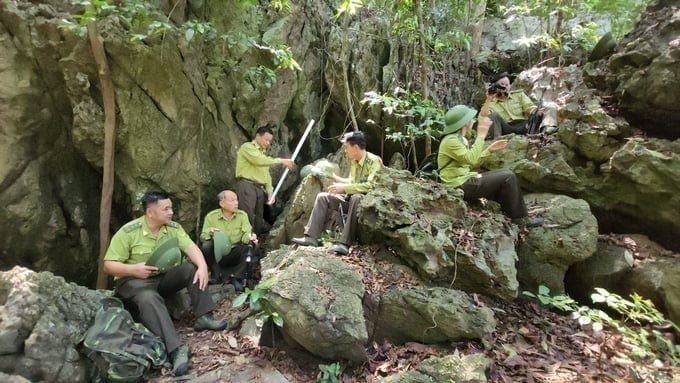May 24, 2025 | 16:24 GMT +7
May 24, 2025 | 16:24 GMT +7
Hotline: 0913.378.918
May 24, 2025 | 16:24 GMT +7
Hotline: 0913.378.918

The Party and State pay special attention to the issue of sustainable forestry development.
The Resolution aims to create a vigorous change in awareness of the forest’s role and importance. Thereby changing behaviors and habits in daily life, production, and consumption; creating motivation for the work of sustainable forest management, protection, and development; and promoting socialization of forest management, protection, and development.
At the same time, the Resolution also aims to develop a sustainable forest economy in a multi-purpose, multi-value direction based on effectively managing and using forest and land resources planned for forestry purposes. Diversify types of organizations, cooperation, linakage, and benefit sharing in forestry production and business towards green, sustainable, and circular production. Mobilize legal resources for the development of a sustainable forest economy.
To effectively deploy Conclusion No. 61-KL/TW dated August 17, 2023 of the Secretariat on continuing to implement Directive No. 13-CT/TW dated January 12, 2017, the Government proposed seven key solutions as following:
First, innovate, diversify, and improve the effectiveness of the work of disseminating, mobilizing, educating, and raising awareness and responsibility for sustainable forest management, protection, and development. Second, perfect laws, mechanisms, and policies on forestry. Third, develop the forest economy. Fourth, organize the effective implementation of national forestry planning and a number of key projects.
Fifth, continue to arrange the organization and apparatus and improve the capacity and efficiency of state management in forestry. Sixth, innovate, develop, and improve the operational efficiency of agricultural and forestry companies. Seventh, promote research and application of science, technology, and digital transformation, and proactively improve the effectiveness of international integration in forestry.
Resolution No. 29 also emphasizes the issue of thoroughly handling land disputes originating from afforestation yards. In particular, the action program will focus on developing and replicating a number of combined agro-forestry-fishery economic models. This aims to both meet the requirements of forest protection and conservation of natural biodiversity and forest ecosystems and promote the resource potential and value of special-use forests. The program also pays attention to developing models for forest protection and conservation of mangrove ecosystems associated with aquaculture.
Along with that, resolve and remove obstacles and difficulties in arranging and innovating agricultural and forestry companies in localities, especially in the handover and reception of forestry companies from ministries and branches to the People's Committees of provinces and municipalities.
Thoroughly handle backlogs and land disputes originating from afforestation yards and forestry companies; put an end to the situation where forestry companies and businesses are allocated land but do not use it (ceded, leased, lent, or contracted) or use it ineffectively. Completely handle overlapping, disputed, and encroached forestry land areas.
The Ministry of Agriculture and Rural Development is assigned as the standing agency, assisting the Government in urging, organizing, guiding, and inspecting the implementation of this Resolution. Handling or reporting to competent authorities to handle problems that arise during the implementation of the Resolution. Reporting annually or irregularly (when required) to the Government on the implementation of this Resolution.
Ministries, ministerial-level agencies, government agencies, and People's Committees of provinces and municipalities review and organize the implementation of assigned tasks in the Government’s Resolution No. 71/NQ-CP dated August 8, 2017, issuing the Action Program to implement Directive No. 13-CT/TW and assigned main tasks.
Translated by Huyen Vu Thu

(VAN) The mutual export of agrifood products between the European Union (EU) and the United Kingdom (UK) must occur again without certification, border controls or other red tape. This was agreed at the UK-EU summit.
/2025/05/22/5121-2-173645_677.jpg)
(VAN) NBSAP Tracker identifies strengths and areas for improvement in the National Biodiversity Strategy, based on each region’s priorities and capacities.

(VAN) The draft amendment to the Circular on rice export trading stipulates a periodic reporting regime for rice exporting enterprises.

(VAN) Dong Thap farmers attained an average profit margin of 64% during the summer-autumn 2024 crop (first season), while An Giang and Kien Giang farmers followed with 56% and 54%, respectively.

(VAN) As a doctoral student doing research on renewable energy and electrification at Harvard University, the author shares his musings on electricity, nature, and countryside memories.

(VAN) The decree on Extended Producer Responsibility (EPR) ensures transparent management and disbursement of support funds, avoiding the creation of a “give-and-take” mechanism.

(VAN) Hue City rigorously enforces regulations regarding marine fishing and resource exploitation, with a particular emphasis on the monitoring of fishing vessels to prevent illegal, unreported, and unregulated (IUU) fishing.